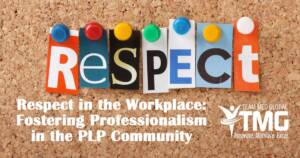
Lately, a troubling pattern has emerged in many healthcare organizations—heightened tensions among colleagues, particularly among women in the workforce. More Provider Lifecycle Professionals (PLPs) are reporting incidents of workplace conflict, including name-calling, accusations, and escalating disputes. As the landscape of professional communication evolves, how can PLPs ensure that respect remains at the center of workplace interactions?
The challenge isn’t just about interpersonal conflict—it’s about maintaining professionalism in a field that demands collaboration, accuracy, and trust. Social media, remote work, and high-pressure environments have contributed to a shift in communication styles, often leading to more reactive and divisive exchanges. For PLPs, who work across credentialing, provider enrollment, licensing, and quality, the ability to engage in difficult conversations with professionalism is crucial—not only for personal career growth but also for maintaining the integrity of healthcare operations.
Why Are Workplace Conflicts on the Rise?
While workplace tensions are nothing new, the way professionals interact has changed. Several factors contribute to this shift, particularly in PLP roles:
Remote Work & Digital Communication: Many PLPs now collaborate across multiple locations, relying on email, messaging platforms, and virtual meetings. Without in-person cues, tone and intent can be misinterpreted, leading to unnecessary friction.
Rising Workplace Pressures: With growing regulatory demands, increasing provider volumes, and shifting healthcare policies, PLPs are often under immense pressure to meet deadlines. Stress can lead to shorter tempers and less patience for nuanced discussions.
Interdepartmental Challenges: PLPs frequently interact with physicians, administrators, legal teams, and insurance companies. Misalignment of expectations, delays in processing, and competing priorities can fuel frustration and internal disputes.
Social Media’s Influence on Communication Norms: The rise of online call-outs and polarized discussions has spilled into professional settings. When workplace disagreements mirror the combative nature of social media, the result is unproductive conflict instead of constructive dialogue.
How PLPs Can Foster Respect — Even in Disagreements
Disagreement is natural in any profession, but in healthcare administration, professionalism must remain the guiding principle. The following strategies can help PLPs navigate difficult conversations while maintaining workplace civility:
Engage in Direct, Professional Dialogue: When conflicts arise, address them directly but professionally. Instead of venting frustrations to colleagues, initiate a conversation with the involved party:
“I’d like to clarify our approach to this provider file. Can we discuss it?”
“I noticed a discrepancy in the data. Let’s review it together to ensure accuracy.”
Assume Positive Intent: Many workplace conflicts stem from misunderstandings rather than intentional malice. If a colleague’s email seems abrupt or a request feels unfair, consider alternative explanations before reacting. Asking clarifying questions can prevent unnecessary tension.
Keep It About the Work, Not the Person: In licensing, credentialing, and provider enrollment, accuracy and compliance are critical. When addressing errors or concerns, focus on the process, not the individual:
Instead of “You always make mistakes on these applications,” try “Let’s double-check the submission process to ensure compliance.”
Model Professionalism: PLPs are the backbone of healthcare compliance and provider verification. Maintaining a standard of professionalism—even when others do not—sets a precedent for the entire team. A calm, solutions-oriented approach to conflict earns long-term respect.
Pause Before Responding: When a conversation becomes heated, stepping away for a moment can prevent regretful responses. A brief pause allows for a more thoughtful, measured reply—one that prioritizes resolution over reaction.
Encourage Mentorship, Not Competition: The PLP field thrives on collaboration, not rivalry. By supporting colleagues—especially newer professionals—PLPs strengthen the industry as a whole. A workplace where knowledge is shared openly fosters a culture of growth rather than division.
Building a Culture of Professionalism in the PLP Field
In an industry that relies on accuracy, compliance, and collaboration, professionalism is not just a courtesy—it’s a necessity. PLPs must navigate complex systems, liaise with multiple stakeholders, and ensure that healthcare providers meet credentialing and regulatory requirements. Effective communication and mutual respect are essential to meeting these demands.
By prioritizing professionalism—even in moments of disagreement—PLPs can contribute to a work environment where respect is the standard, not the exception. Whether working in a hospital, managed care organization, or CVO, the goal remains the same: ensuring excellence in healthcare operations while maintaining a culture of integrity.
Conflict is inevitable, but how we handle it defines our professional legacy. Let’s ensure that respect leads the way.

